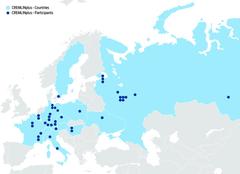URL: https://www.desy.de/news/news_search/index_eng.html
Breadcrumb Navigation
DESY News: Green light for EU project CREMLINplus
News
News from the DESY research centre
Green light for EU project CREMLINplus
The European Commission has relaunched the successful EU project CREMLIN in a significantly expanded form. Under the name CREMLINplus (Connecting Russian and European Measures for Large-scale Research Infrastructures - plus), the Horizon 2020 project will continue to promote cooperation between large-scale research infrastructures in Russia and the European Union from 2020 onwards. The CREMLINplus consortium brings together 35 partners, 10 from Russia and 25 from the EU and associated countries. The EU project coordinated by DESY will receive a budget of 25 million euros over the entire four-year period.

Partnerländer und -institutionen im neuen Projekt CREMLINplus. Bild: DESY
The project builds on the findings and recommendations of its predecessor and consists of three pillars: On the one hand, it promotes scientific and technical cooperation between European-Russian teams in large-scale analytical and physical Russian research projects such as the neutron source PIK in Gatchina near St. Petersburg, the ion collider facility NICA in Dubna and a fourth-generation synchrotron radiation source in Novosibirsk. This pillar also includes a special work package promoting European-Russian cooperation in the development of the latest detector technologies, such as those used in nuclear physics experiments and at neutron sources.
A second focus of the project will be the development of an access model to Russian large-scale research facilities based on a clearly defined catalogue of criteria, similar to the European Charter for Access. The aim is to facilitate access to Russian facilities not only for Russian scientists but also for European users in particular. Finally, CREMLINplus provides for an extensive training and education programme for Russian and European managers at large-scale research infrastructures. The aim of the project is to achieve a significantly higher level of cooperation between EU and Russian partners in the field of large-scale research infrastructures.
The CREMLINplus partners are DESY, the Budker Institute of Nuclear Physics, the Institute of Applied Physics of the Russian Academy of Sciences, the International Centre for Innovations in Science, Technology and Education, the Institute for Nuclear Research of the Russian Academy of Sciences, the Joint Institute for Nuclear Research, the National Research Nuclear University "MEPhI", the National Research Center Kurchatov Institute, the National University of Science and Technology MISIS, the IOFFE Physico-Technical Institute of the Russian Academy of Sciences, the Saint Petersburg State University, the Eberhard-Karls-Universität Tübingen, the European X-Ray Free-Electron Laserfacility GmbH, the Facility for Antiproton and Ion Research in Europe FAIR, the Forschungszentrum Jülich, the Johann-Wolfgang-von-Goethe-Universität Frankfurt am Main, the Helmholtz-Zentrum Geesthacht Zentrum für Material- und Küstenforschung, the Justus-Liebig-Universität Giessen, the Technische Universität München, the Commissariat à l'Énérgie Atomique et aux Énérgies Alternatives, the European Synchrotron Radiation Facility ESRF, the Institut Max von Laue - Paul Langevin, the Centre National de la Recherche Scientifique CNRS, the Université Clermont Auvergne, the Association Internationale Extreme-Light-Infrastructure Delivery Consortium, the Nuclear Physics Institute of the Czech Academy of Sciences, the Magyar Tudomanyos Akademia Energiatudomanyi Kutatokozpont, the Magyar Tudomanyos Akademia Wigner Fizikai Kutatokozpont, the Istituto Nazionale di Fisica Nucleare, the Università degli Studi di Milano-Bicocca, the Austrian Drug Screening Institute, the European Organization for Nuclear Research CERN, the Politechnika Warszawska, the European Spallation Source ESS ERIC, the Institute for Nuclear Research of the National Academy of Sciences of Ukraine and the Laserlab-Europe AISBL.
Further information
Review of the CREMLIN project: https://ec.europa.eu/research/infocentre/article_en.cfm?artid=50030



